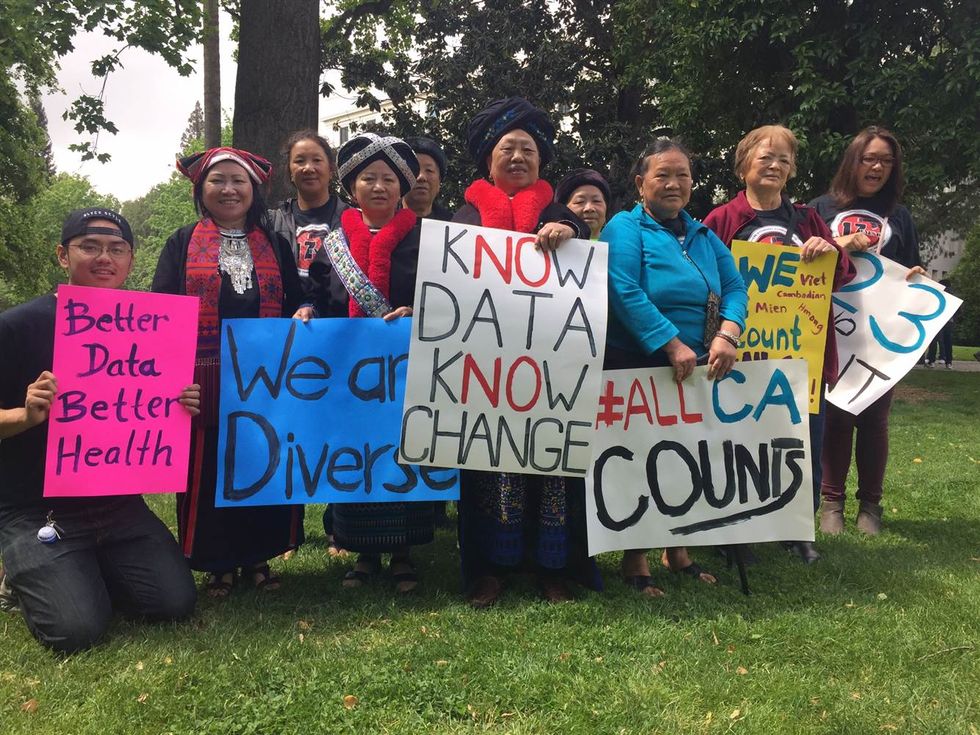In case you missed it, here are parts one and two of this series.
AB-1726
Nkauj Iab Yang’s name is distinctly Hmong. I instantly recognized it as such due to the consecutive consonants and the clan name “Yang,” one of around a dozen clan names bestowed upon the Hmong community. Besides a shared ethnicity with Lia Lee, Yang also shared a struggle concerning the health system in this state. Yang is the California director of programs and policies at the Southeast Asia Resource Action Center (SEARAC, pronounced “see rack”). SEARAC is a national advocacy group for Asian Americans with offices in Washington, DC and Sacramento, CA. The Sacramento office, where Yang is based, does community work such as lobbying for policy and making sure policy works for those directly affected by it. SEARAC helped roll out campaigns geared towards different East Asian communities to help people sign up for Covered California, California’s public health care marketplace.
“SEARAC works to make sure our communities are aware of the changes, but also to work with Covered California to ensure they are doing their best to reach out to our communities, whether that means being able to provide translated materials or knowing how to reach the community.” Yang said.
SEARAC works extensively with health care access, both physical and mental. After AB-176 was vetoed, and reintroduced as AB-1726, SEARAC knew they were in a unique position to lobby.
“We know that disaggregating data is something that we need,” Yang explained. “So when AB-1726 got introduced this year, we decided we needed to be a lot more organized and strategic.”
So SEARAC became the lead sponsor of the bill. Soon the bill would gain other major sponsors, such as the Asian & Pacific Islander Health Forum, Empowering Pacific Islander Communities (EPIC) and the California Pan-Ethnic Health Network (CPEHN).
CPEHN, a Sacramento, CA-based, statewide health advocacy organization, works to improve health access for communities of color. Such policy is important to Kimberly Chen, director of policy at CPEHN, who believes such a bill is necessary to address all the disparities in the API community.
“Without data disaggregation, those really stark health disparities would not be visible. There wouldn’t be opportunities to address them.”
Invisible Data
When the Affordable Care Act (ACA) was signed by President Obama in 2010, it sought to give health care access to Americans who couldn’t afford it. Covered California, California’s official health care marketplace, became subject to the ACA’s provisions. Although more Americans are insured than ever before, disparities still exist in low-income communities and communities of color. The API community in California served to be no exception. When data was aggregated into the catch-all categories the State had before AB-1726, those disparities became almost impossible to find.
That invisibility can have serious consequences for some people’s health.
“One thing I always use as an example is when you get to a certain age, you’re supposed to get screened for colon cancer,” Yang explained. “But if we’re not collecting data, we aren’t able to see maybe colon cancer and liver cancer are big issues within the Southeast Asian community and maybe we should actually be screening for both. So if we’re screening for only colon cancer, then there is the missed opportunity to screen for a common disease like liver cancer, and we’re not able to do any kind of prevention or early intervention with them.”
In the state of Utah, the effects of exposing disaggregated data have already made an impact. Since 2010, the Utah Department of Health has ramped up their efforts to provide more disaggregated data to keep track of certain health issues such as learning disabilities and adolescent obesity. By 2011, the state reported that the API infant mortality rate was unusually high. With disaggregation, the Department of Health determined that Pacific Islander and Native Hawaiian infant deaths, (at 8.4 deaths per 1,000 children, compared to the statewide average of 4.4 deaths per 1,000) and not Asian American or Native Hawaiian infant deaths, were driving the mortality rates up.
The discovery of the disaggregated differences led the Utah Office of Health Disparities to establish It Takes a Village: Giving Our Babies the Best Chance, a program aimed at providing increased education on prenatal care and postpartum health aimed at the Pacific Islander and Native Hawaiian community in Utah.
Proponents of AB-1726 hope to follow in Utah’s lead in exposing health hazards they feel are invisible.
Look for more of the series in the coming weeks.
















